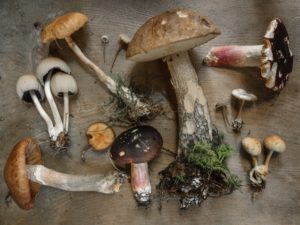We are looking for motivated students who want to work on an exciting new project on sustainability and wild foods in the new UNESCO Biosphere Reserve in Nordhordland.
You will be part of field work where we are conducting ecological assessments to evaluate the potential to supply wild foods in the region. We are conducting mushroom and berry surveys in different habitat types across the municipality of Alver from mid-August until mid-October.
Project description
Wild foods, like mushrooms and berries, have been an important resource throughout human history but their role has changed in pace with a changing society. In the past wild foods were an essential food source, whereas in recent times wild food ‘foraging’ has become an enjoyable outdoor activity with strong cultural benefits. As any ecosystem service, wild foods can be understood as an important human benefit with direct links to ecosystem functioning, and a closer look into this system can help us understand how this service contributes to social-ecological resilience.
In this project we are investigating the different aspects of the ecosystem service cascade of wild foods in the newly declared Nordhordland Biosphere Reserve. You will be part of conducting ecological assessments to evaluate what the potential of the region is to supply this service, by conducting mushroom and berry surveys in the field. You also have the chance to help collecting social surveys on what wild food collection means to people in the region.
Tasks

We need you to help us conduct field visits in which you will learn how to and help conduct vegetation, soil and mushroom surveys, in addition to making other site measurements, in different habitats across Alver municipality. You will need to come to spend a day or a morning in the field, depending on the job.
There is also the possibility of lab work too, processing mushroom and berry samples, and preparing soil samples for analysis.
The total time commitment is 1-3 days a week, for up to 8 hours a day, from the 17th of August until mid-October. We can discuss which days and times are convenient for you.
The project involves: labwork / fieldwork
Starting date/period: 16 August 2020 – 31 October 2020.
Experience
What we offer: You will learn important terrestrial ecology skills in the field (and possibly the lab). You will learn about ecosystem services, conducting vegetation and mushroom surveys and conducting ecosystem service assessments. Our group has a special sustainability science focus in which you will learn the strengths of inter-disciplinary work. You will get to see cool places and meet interesting people!
What you offer: You should be serious and reliable with your time commitments.
Involvement
Min 20 hours, Max 40 hours
Interested by this project? Need more info? Contact Alicia Donnellan Barraclough (alicia.barraclough@uib.no) and Jarrod Cusens (jarrod.cusens@uib.no)
Project number: 031

